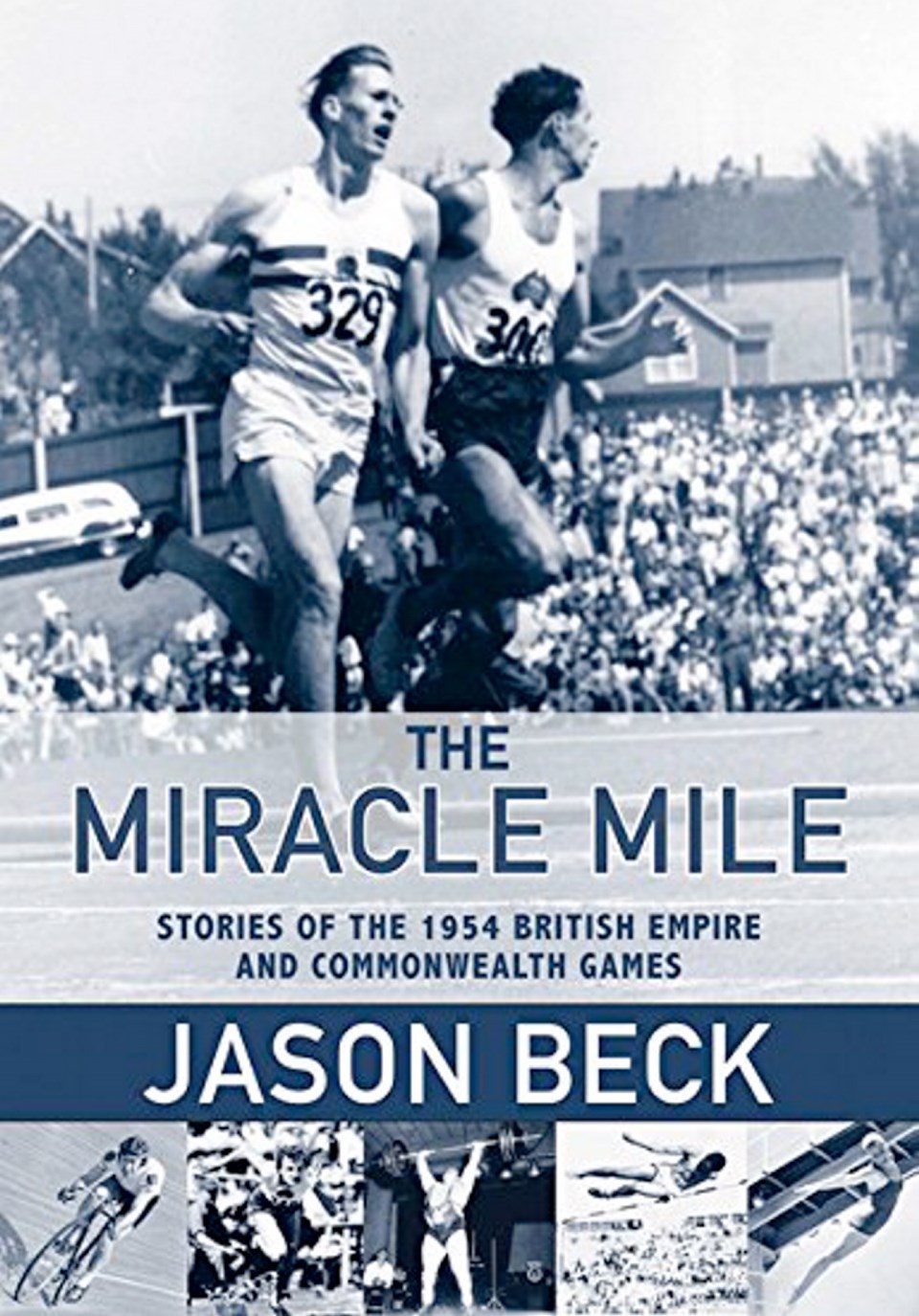The Miracle Mile — Stories of the 1954 British Empire and Commonwealth Games; by Jason Beck; Caitlin Press Inc.; 288 pages; $29.95.
Before there was Sidney Crosby’s golden goal in the 2010 Vancouver Winter Olympics, and before the Commonwealth Games returned to B.C. in 1994 in Victoria, there was the Miracle Mile.
It still stands as a B.C. sporting and cultural touchstone, a fact made even more remarkable in that Canadians weren’t even among the two major focal points of the race.
That seminal moment in this province’s sporting history, and others surrounding it during the 1954 British Empire and Commonwealth Games, are brought vividly to life in The Miracle Mile by Jason Beck.
The modern era of B.C. sport began with the 1954 Games. They ushered in not only the revolutionary occasion of two men running the mile in under four minutes in the same race for the first time in history, but also gave us Empire Stadium, which directly led to the birth of the B.C. Lions in the Canadian Football League.
While the Vancouver Millionaires and Victoria Cougars Stanley Cup triumphs of 1915 and 1925, respectively, seem like ancient history, there is something still contemporary about the 1954 Games because there are people around who were there. They include eventual two-time Olympian Terry Tobacco, who came out of the tiny Island mining community of Cumberland as a skinny 17-year-old to run amid the shouting and tumult of Empire Stadium, and win silver and bronze medals as a home-province prodigy in the 1954 Games.
Even at that, however, 1954 might be considered another world for millennials.
It felt like an out-of-body experience for Beck to be researching and writing this book starting in 2006. Just when all this province’s attention and energy were focused on hosting the 2010 Winter Olympics, Beck was immersed in another time.
“It was kind of surreal, and a weird bit of timing,” Beck said.
While others were debating whether Roberto Luongo or Marty Brodeur should be Canada’s 2010 starting goaltender, Beck was busy interviewing the likes of Sir Roger Bannister and John Landy.
“I remember the 2010 torch relay was going by, and yet my mind was totally focused on 1954. It was bizarre. But 2010 came and went.”
And Beck stayed in 1954.
It took several years more of writing and research before Beck’s book finally came out this spring. It is an exhaustive and engaging look back to those nine days in the summer of 1954 that changed a province and how it thought about itself and its place in the world. This truly was B.C.’s coming-out party.
As the curator and facilities director of the B.C. Sports Hall of Fame, Beck seems perfectly situated to chronicle it.
“In my job, I didn’t have to go looking for these stories. These stories from 1954 kept finding me,” said the native of Sumas in the Fraser Valley, who grew intrigued by tales of the Games rowing races, which occurred on the Vedder Canal and just a stone’s throw from where he grew up.
“I thought to myself: ‘Maybe it’s time somebody compiled them.’ ”
That he has done, and then some, in a book running more than 300 pages.
Although downgraded in this era because every sport now has an annual world championship, and an almost weekly series of World Cup races, the Commonwealth Games and Pan American Games hearken to a time when they were major events because there were so few other opportunities for top athletes from different nations to compete against each other.
Beck captures that era in sporting history.
With the detailed, yet nuanced, historical touch that has gone into this work, it’s hard to believe Beck is only 34 years old, because he writes with an old soul.
The two most famous tales from 1954, of course, are from the last day of the Games — the epic mile won by England’s Bannister against the rising Aussie upstart Landy, followed quickly by dehydrated and dazed Englishman Jim Peters’ agonizing final lap of the marathon, in which he collapsed into the arms of the English team trainer just steps from victory.
“The Miracle Mile was everything people thought it would be,” Beck said.
“Yet it’s Peters that many people remember most vividly. It is remarkable that the two most famous events in the history of the Games occurred on the same afternoon just half an hour apart.”
What isn’t lost on Beck is the role sport has played in this province and its continued ability to bring people together in a common cause: “When you look at the four biggest international events B.C. has hosted — the 1954 and 1994 Commonwealth Games, 2010 Winter Olympics and Expo 86 — I think it’s telling and significant that three of the four are sports events.”
In a touching closing of the circle, Bannister and Landy returned to B.C. 40 years later as the co-guests of honour at the 1994 Victoria Commonwealth Games.
Jason Beck will read from The Miracle Mile and sign books, which will be for sale through Munro’s Books, on Wednesday, June 29, from 7 p.m. to 8:30 p.m. at the Greater Victoria Public Library Main Branch, Community Room, 735 Broughton St. On hand to meet the public will be athletes from the 1954 Games, media members and Island athletes heading for the 2016 Rio Summer Olympics.
cdheensaw@timescolonist.com



